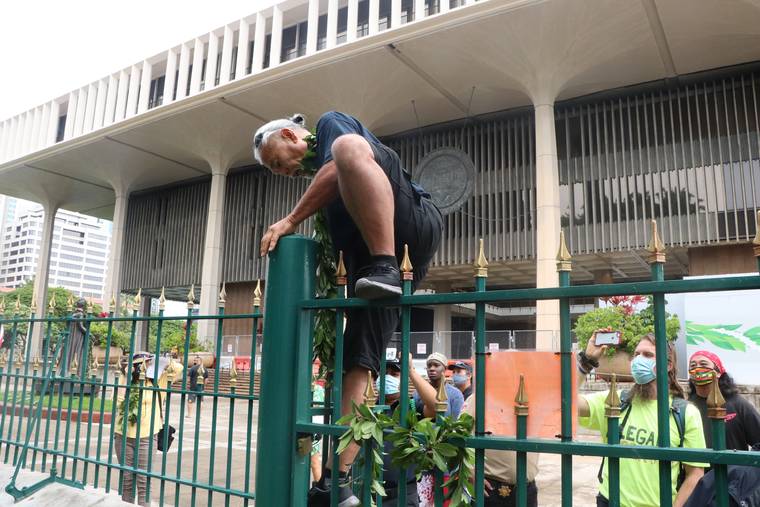A 64-year-old Hilo man who was the leader of a group that planted the “kanaka garden” earlier this month at Wailoa River State Recreation Area in Hilo was arrested Sunday morning after entering the closed Iolani Palace grounds in Honolulu.
A 64-year-old Hilo man who was the leader of a group that planted the “kanaka garden” earlier this month at Wailoa River State Recreation Area in Hilo was arrested Sunday morning after entering the closed Iolani Palace grounds in Honolulu.
Longtime activist Gene Tamashiro was charged with entering a closed state park and violating the state’s COVID-19 emergency rules, the state Department of Land and Natural Resources said in a statement.
Prior to his arrest, Tamashiro and a group of about a dozen supporters gathered in the mall between the state Capitol and the palace. Tamashiro had informed the DLNR Division of Conservation and Resources Enforcement he intended to enter the palace grounds if he wasn’t given permission to gather to mark the anniversary of the overthrow of the Hawaiian Kingdom.
Iolani Palace has been closed on Sundays, since almost the beginning of the COVID-19 pandemic.
At about 10:30 a.m. DOCARE Chief Jason Redulla spoke to Tamashiro and his group and explained that without a permit from the DLNR Division of State Parks they would not be allowed to enter the grounds. Tamashiro produced a long scroll of documents which he claims show the illegal overthrow of the kingdom and questions the legality of ownership of the palace by the state.
After climbing the fence and entering the palace grounds, Tamashiro was handcuffed by DOCARE officers and taken by state sheriff’s deputies for booking. His bond was set at $2,500.
Tamashiro was cited by DOCARE in Hilo on Jan. 7 for three violations of Hawaii Administrative Rules associated with the kanaka garden and ordered to appear at 8:30 a.m. Feb. 19 in Hilo District Court.
The citations charge him with leaving abandoned property on public lands, which were two flags he allegedly planted in the park, plus unauthorized use of state lands for agriculture use and introducing plants onto public property.




